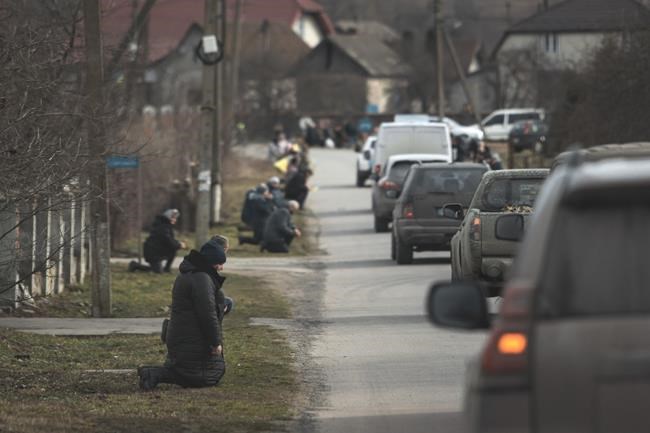KYIV, Ukraine (AP) — A barrage of more than 80 Russian missiles and a smaller number of exploding drones hit residential buildings and critical infrastructure across Ukraine on Thursday, killing six people and leaving hundreds of thousands without heat or electricity.
The largest such attack in three weeks also put Europe’s largest nuclear plant at risk by knocking it off the power grid for nearly half of the day before it was reconnected. Because nuclear reactors need constant power to run cooling systems to avoid a meltdown, the latest power loss at the Zaporizhzhia plant again raised the specter of a nuclear catastrophe.
Air raid sirens wailed through the night as the attacks targeted a wide swath of the country, including western Ukraine, which is far from the front lines. President Volodymyr Zelenskyy said the assault that came while many people slept was an attempt by Moscow “to intimidate Ukrainians again.”
The Russian Defense Ministry said the strikes were in retaliation for a recent incursion into the Bryansk region of western Russia by what Moscow claimed were Ukrainian saboteurs. Ukraine denied the claim and warned that Moscow could use the allegations to justify stepping up its own assaults.
The Kremlin’s forces started targeting Ukraine’s power supply last October in an apparent attempt to demoralize the civilian population and compel Kyiv to negotiate peace on Moscow’s terms. The attacks later became less frequent, and analysts speculated that Russia may have been running low on ammunition. The last major bombardment was Feb. 16.
The head of the U.N. nuclear watchdog agency said the Russia-controlled Zaporizhzhia nuclear plant lost all external power for 11 hours after its last remaining power line was disconnected following reports of the missile strikes. Rafael Grossi of the International Atomic Energy Agency emphasized that the incident “again demonstrated how fragile and dangerous the situation is” for the plant.
Overall, Russia launched 81 missiles and eight exploding Iranian-made Shahed drones Thursday, according to Ukraine’s chief commander of the armed forces, Valerii Zaluzhnyi. Thirty-four missiles were intercepted, as were four drones, he said. The mixture of munitions makes it harder for air defenses to cope with the onslaught, military analysts say.
Among the weapons were six hypersonic Kinzhal cruise missiles, which are among the most sophisticated weapons in the Russian arsenal, Ukrainian air force spokesman Yurii Ihnat said. Ukraine says its air defenses cannot intercept them.
The Russian Defense Ministry said the barrage hit military and industrial targets in Ukraine “as well as the energy facilities that supply them.”
The missile strikes took no toll on the army’s combat capability, but they played “on the nerves of the civilian population of Ukraine,” Ukrainian military analyst Oleh Zhdanov told The Associated Press.
Nearly half of households in Kyiv were without heat, as were many in Kharkiv, Ukraine's second-largest city, where the water was also cut on a day when outdoor temperatures were expected to fall to around freezing, local officials said.
Around 150,000 households were left without power in Ukraine’s northwestern Zhytomyr region. In the southern port of Odesa, emergency blackouts occurred due to damaged power lines.
Viktor Bukhta, a 57-year-old resident of Kyiv’s Sviatoshynski district, where officials said three people were wounded, said a missile landed nearby in the early morning.
“We went into the yard. People were injured,” he said. “Then the cars caught fire. We tried to extinguish them with car fire extinguishers. And I got a little burned.”
Grossi said he was “astonished by the complacency” of members of the organization he leads in relation to the dangers at the Zaporizhzhia plant.
“What are we doing to prevent this happening?" Grossi asked the agency's board of directors in a meeting Thursday, according to a statement from the organization.
“Each time we are rolling a dice,” he said. “And if we allow this to continue time after time, then one day our luck will run out.”
The agency has placed teams of experts at all four of Ukraine’s nuclear power plants to reduce the risk of accidents.
Ukrainian Foreign Minister Dmytro Kuleba tweeted that the attack had “no military objective, just Russian barbarism.”
Smoke could be seen rising from a facility in Kyiv’s Holosiivskyi district, and police cordoned off all roads leading to it.
Three men and two women were killed in the western region of Lviv after a missile struck a residential area, Gov. Maksym Kozytskyi said. Three buildings were destroyed by fire, and rescue workers combed through rubble looking for more possible victims, he said.
A sixth person was killed and two others wounded in multiple strikes in the Dnipropetrovsk region that targeted its energy infrastructure and industrial facilities, Gov. Serhii Lysak said.
Aside from the hail of missiles, Russian shelling killed six other civilians from Wednesday to Thursday, Ukrainian officials said, including three people at a bus stop in Kherson.
___
Follow AP’s coverage of the war in Ukraine: https://apnews.com/hub/russia-ukraine
Hanna Arhirova And Elena Becatoros, The Associated Press




